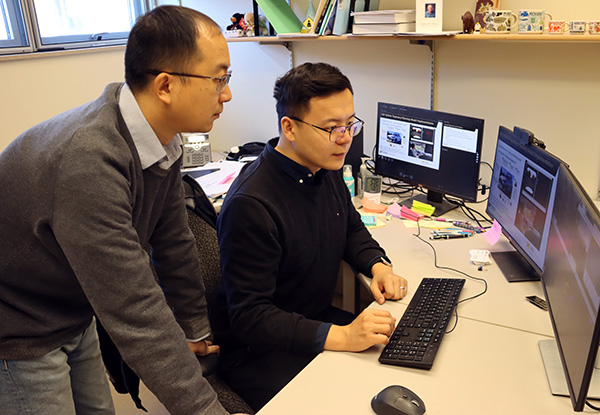Big Ten partnership allows for remote testing of autonomous vehicle in a mixed reality environment

Through a partnership between Big Ten programs, Purdue University researchers are remote testing their autonomous vehicle from a state away.
A research team, led by Lyles School of Civil Engineering Assistant Professor and Assistant Director of the Center for Road Safety Yiheng Feng, has partnered with the University of Michigan’s Mcity 2.0 to conduct the first remote testing of autonomous vehicles (AV) in a mixed reality environment. The partnership came about, Feng said, as a result of mutual needs and benefits.
“At Purdue, we are able to test a truly autonomous vehicle — a luxury that a lot of research teams do not have,” Feng said. “However, we can test it locally in a closed environment, which means the testing scenarios we can explore are limited.”
Feng’s team is the first to conduct live remote testing with Mcity, but the technology will ultimately be available to academic researchers across the country.
The AV motion planning algorithm developed by Purdue’s Connected Automated and Resilient Transportation (CART) Lab is running at the Purdue campus in West Lafayette, Ind., while controlling a real AV more than 200 miles away at the Mcity test facility in Ann Arbor, Mich. Meanwhile, the real AV is interacting with virtual background vehicles generated from a simulation platform.
“The Purdue team’s use of Mcity 2.0 was especially valuable because it represents the academic research community our technology is intended to support,” said Henry Liu, Mcity Director and Bruce D. Greenshields Collegiate professor of Civil and Environmental Engineering at U-M. “Purdue does not have a test facility of its own, which means the research team cannot test its AV algorithms in a safe, real-world environment rather than on public roads. Mcity 2.0 enabled the Purdue team to test the validity of its work and proved the concept of remote AV testing.”
While the testing was underway, Feng and his team were able to see multiple onboard camera views from the AV under test, as well as views from fixed cameras along the test track. They could also see a digital representation of the physical AV’s dashboard, with information on throttle, braking, current speed and targeted speed.
A digital map of the test facility showed the randomly-generated traffic interactions between the AV and the background vehicles. Feng and his team did not know in advance what those interactions – being cut off by another vehicle, a virtual pedestrian crossing the street, even a crash – might be.
“The data we have gathered and the partnership with Mcity has pushed our research forward substantially,” said Purdue Civil Engineering PhD student researcher Wangzhi Li. “What we have been able to achieve through his partnership, I think, has been incredibly beneficial to both universities.”
When the testing was over, Purdue had uncovered issues with its algorithm the researchers otherwise might not have discovered easily or quickly. Feng said the next stage in their research is to review the collected data with further testing to come in 2024.
“We are focusing now on taking what we’ve learned and further improving the autonomous vehicle control models,” Feng said. “We’re excited to see where the next phase in our research will take us.”
More on CART Lab
The CART Lab at Purdue focuses on the fast evolution of the next-generation transportation systems. Its main research goals are developing innovative modeling techniques, control strategies, and evaluation methods for smart transportation infrastructure and connected and automated vehicles (CAVs). It focuses heavily on studying the interactions between infrastructure and smart vehicles to improve safety, mobility, and resilience of the transportation system.
The lab has three major research directions, including cooperative driving automation, transportation system cybersecurity, and intelligent vehicle testing and evaluation. The lab’s research is sponsored by National Science Foundation (NSF), U.S. Department of Transportation (USDOT), Indiana Department of Transportation (INDOT), USDOT Center for Connected and Automated Transportation (CCAT), and USDOT National Center for Transportation Cybersecurity and Resiliency (TraCR)
More on Mcity
U-M’s Mcity is leading the transition to a new world of mobility. As an interdisciplinary public-private partnership, its work goes beyond technology and considers all aspects of the future of transportation. Mcity offers early-stage testing and deployment, funding for a wide range of mobility research and data collection, and a commitment to education and outreach.
Mcity’s labs enable the comprehensive testing, evaluation, and demonstration of connected and automated vehicles, as well as the technologies behind them. From the safe, controlled conditions of the Mcity Test Facility to the real-world environments of on-road vehicle deployments in Ann Arbor and beyond, Mcity labs offer an essential combination of resources for ensuring the safe rollout of emerging mobility solutions.
